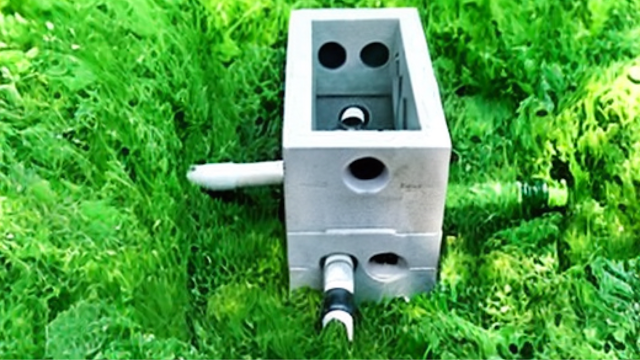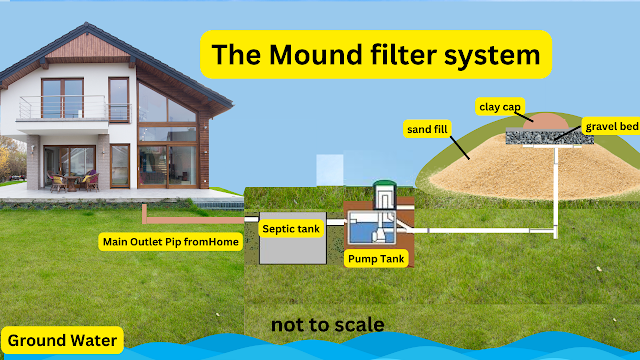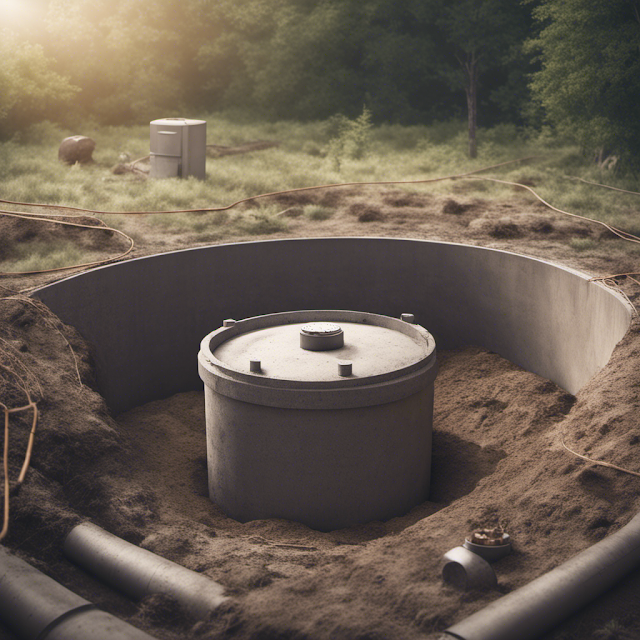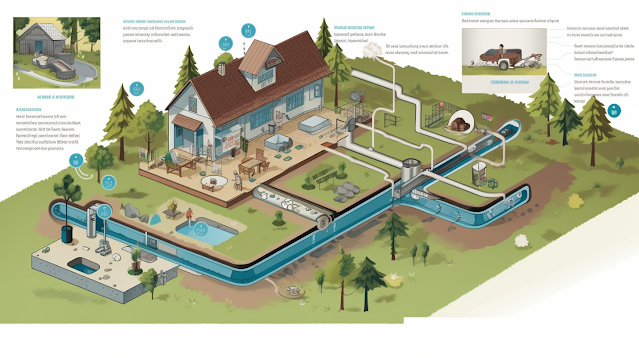Preventing Septic Tank Pollution And Protecting The Environment
 |
| Preventing Septic Tank Pollution And Protecting The Environment |
Welcome to this article on preventing septic tank pollution and protecting the environment. As an environmental scientist or engineer, you understand the importance of maintaining a healthy ecosystem for the well-being of both humans and nature. Septic tanks play a vital role in waste management, but without proper maintenance, they can become a significant source of pollution. In this article, we will explore evidence-based research and data to provide you with practical solutions for preventing septic tank pollution. By following these recommendations, you can actively contribute to safeguarding our environment.
Through regular inspections and pumping, you can ensure that your septic system operates efficiently. Proper disposal of household waste and using environmentally-friendly cleaning products are crucial steps towards minimizing pollutants entering our waterways. Conserving water and implementing advanced treatment systems are also effective strategies
in reducing wastewater contamination. Promoting community awareness and involvement, monitoring water quality, and collaborating with local government and environmental organizations are essential elements in achieving long-term success. Join us as we dive into the scientific principles behind preventing septic tank pollution while offering actionable recommendations for individuals, communities, and policymakers alike. Together, we can protect our environment for future generations.
Key Takeaways
- Regular inspections and proper maintenance are necessary for efficient septic system operation and to prevent septic tank pollution.
- Proper waste disposal practices, such as avoiding flushing harmful substances and separating recyclables, help minimize pollutants entering waterways.
- Using environmentally-friendly cleaning products reduces chemical exposure and supports sustainable production practices, preventing septic tank pollution.
- Conserving water through the use of low-flow fixtures, repairing leaks, and practicing smart irrigation techniques is crucial for preventing septic tank pollution and protecting the environment.
Understanding the Importance of Proper Septic Tank Maintenance
You can't afford to ignore the importance of properly maintaining your septic tank if you want to safeguard the environment and prevent disastrous pollution. As an environmental scientist or engineer, it's crucial to approach the topic of preventing septic tank pollution and protecting the environment using scientific principles and methods. Relying on evidence-based research and data, I'll present information objectively, avoiding personal opinions or biases.
One major concern regarding septic tanks is the potential for septic tank leakage. A leaky septic tank can lead to water leaking into the surrounding soil, contaminating groundwater and nearby water bodies. This contamination can have severe impacts on aquatic ecosystems, as well as pose a health risk to humans who rely on these water sources for drinking or recreation. Another issue that arises with old septic tanks is their decreased efficiency in treating wastewater. Over time, these tanks may become clogged or overloaded with solids, resulting in inadequate treatment of sewage before it enters the environment. This not only contributes to septic tank pollution but also increases the risk of disease transmission through exposure to untreated wastewater.
To address these concerns, regular inspections and pumping are essential. By scheduling routine inspections by a qualified professional, you can identify any issues with your septic system early on and take appropriate actions to mitigate them. Pumping out accumulated solids from your septic tank at regular intervals ensures its optimal functioning and prevents leaks or overflows. Understanding the importance of proper septic tank maintenance is crucial in preventing septic tank pollution and protecting the environment.
Regular inspections and pumping play a vital role in ensuring your system functions efficiently without causing harm. Transitioning into the subsequent section about 'regular inspections and pumping,' it's important to explore effective strategies for implementing these maintenance practices.
Regular Inspections and Pumping
Regular inspections and pumping ensure that the septic system remains clean and efficient, prolonging its lifespan. By regularly inspecting the septic tank, you can identify any potential issues before they become major problems. Inspections allow you to assess the condition of the tank, check for leaks or cracks, and ensure that it's functioning properly. If any issues are found during an inspection, prompt repairs can be made to prevent further damage. Pumping is another crucial aspect of septic tank maintenance.
Over time, solid waste accumulates in the tank and forms a layer of sludge at the bottom. This sludge must be removed periodically through pumping to prevent it from overflowing into drain fields or contaminating groundwater sources. Regular pumping not only prevents pollution but also helps maintain the efficiency of your septic system.
To further enhance your understanding, consider these nested bullet points: - Benefits of regular inspections: - Early detection and prevention of potential problems - Avoidance of costly repairs - Importance of regular pumping: - Removal of accumulated sludge - Prevention of contamination As an environmental scientist or engineer addressing this issue objectively, it's vital to rely on evidence-based research and data.
By examining scientific studies on septic tank pollution's impacts on the environment, we can better understand its significance and develop effective solutions.
Transitioning into the next section about proper disposal of household waste without explicitly stating 'step,' it's essential to consider how our actions at home can contribute to preventing septic tank pollution and protecting the environment.
Proper Disposal of Household Waste
Implementing appropriate waste disposal practices in our homes is crucial for maintaining a clean and sustainable living environment. As an environmental scientist or engineer, I'd approach the topic of preventing septic tank pollution and protecting the environment using scientific principles and methods.
I'd rely on evidence-based research and data to support my claims and recommendations, ensuring that the information presented is unbiased and objective. When it comes to proper disposal of household waste, there are several key factors to consider. First, it's important to separate different types of waste into their respective categories such as recyclables, organic waste, and non-recyclable materials.
This allows for easier recycling and prevents contamination of other waste streams. Additionally, it's essential to avoid flushing harmful substances down the drain or toilet. Chemicals like paint thinners, pesticides, or medications can have detrimental effects on both human health and the environment when they enter wastewater systems. Instead, these items should be taken to designated collection points for safe disposal.
Furthermore, practicing water conservation is vital in reducing the amount of wastewater generated from our homes. Simple measures like fixing leaky faucets or installing low-flow showerheads can significantly reduce water consumption while minimizing the strain on septic systems. By implementing proper waste disposal practices in our homes, we can significantly contribute to preventing septic tank pollution and protecting the environment.
Next up: using environmentally-friendly cleaning products that are safer for both our families and ecosystems.
Using Environmentally-Friendly Cleaning Products
Switching to environmentally-friendly cleaning products ensures a safer and healthier home for your family while minimizing harm to ecosystems. By choosing these products, you can actively contribute to the prevention of septic tank pollution and protect the environment. Here are three reasons why making this switch is beneficial: - Reduced chemical exposure: Environmentally-friendly cleaning products are formulated without harsh chemicals, such as phosphates and chlorine bleach.
These chemicals can be harmful not only to aquatic life but also to human health when they're released into the environment. By using eco-friendly alternatives, you decrease the risk of exposure to these potentially hazardous substances. - Preservation of water quality: Conventional cleaning products often contain ingredients that can contaminate water sources through septic tank systems. When these pollutants enter rivers, lakes, or groundwater, they disrupt delicate ecosystems and pose risks to aquatic organisms.
Environmentally-friendly options minimize water pollution by utilizing biodegradable ingredients that break down naturally without causing harm. - Sustainable production practices: Many environmentally-friendly cleaning product brands prioritize sustainable manufacturing processes. They incorporate renewable resources and use less energy during production compared to traditional counterparts. By supporting these companies, you help promote responsible consumption and reduce your environmental footprint.
By switching to environmentally-friendly cleaning products, you take a crucial step towards preventing septic tank pollution and protecting the environment for current and future generations.
In the next section on conserving water and reducing wastewater, we'll explore additional strategies for minimizing pollution from household activities without compromising cleanliness or convenience.
Conserving Water and Reducing Wastewater
By adopting water-conserving habits and minimizing wastewater, you can make a significant impact on preserving our planet's resources and promoting sustainable living. Conserving water is crucial for preventing septic tank pollution and protecting the environment. When we reduce our water usage, we decrease the amount of wastewater that enters our septic systems. This not only helps to prevent contamination of groundwater and nearby bodies of water but also extends the life of our septic tanks.
One way to conserve water is by installing low-flow fixtures in your home. These fixtures, such as low-flow toilets and showerheads, use less water without sacrificing performance. Additionally, repairing any leaks or drips in your plumbing system can go a long way in reducing wasteful water consumption. Another effective method is practicing smart irrigation techniques for outdoor watering.
Watering your yard during cooler parts of the day, like early morning or late evening, reduces evaporation and ensures that plants absorb more moisture. Additionally, using drip irrigation systems or installing rain barrels can help capture rainwater for later use instead of relying solely on municipal water supplies. Being mindful of daily activities that consume large amounts of water is also important.
For example, washing dishes efficiently by filling up one sink with soapy water instead of continuously running the faucet can save gallons each time you clean up after meals. Conserving water and reducing wastewater are key steps towards preventing septic tank pollution and protecting our environment. By making small changes in our daily routines, we can minimize our ecological footprint while promoting sustainable living practices.
Educating homeowners on best practices will further enhance these efforts to safeguard our precious resources for future generations without compromising their quality or availability.
Educating Homeowners on Best Practices
Learn how you can make a positive impact on our planet by educating yourself and others about the best practices for conserving water and reducing wastewater in your home. As an environmental scientist or engineer, I approach the topic of preventing septic tank pollution and protecting the environment using scientific principles and methods. I rely on evidence-based research and data to support my claims and recommendations.
Conserving water is crucial for minimizing the amount of wastewater generated in your household. Simple actions such as fixing leaks, installing low-flow fixtures, and using water-efficient appliances can significantly reduce water consumption. Additionally, being mindful of your daily habits like turning off the tap while brushing your teeth or taking shorter showers can save gallons of water each day.
Reducing wastewater also involves proper management of household activities that produce it. For instance, avoid disposing large amounts of fats, oils, or grease down the drain as they can clog pipes and disrupt septic tank functionality. Instead, dispose of them in designated containers or recycle them if possible. Similarly, limit the use of harsh chemicals that may harm beneficial bacteria within septic systems responsible for breaking down solid waste. Educating homeowners about these best practices is essential to ensure a sustainable future for our environment.
By understanding how their actions impact water conservation and wastewater reduction, individuals can implement changes that positively affect both their households and broader ecosystems.
Implementing advanced treatment systems is another effective step towards preventing septic tank pollution and protecting the environment without compromising public health.
Implementing Advanced Treatment Systems
Implementing advanced treatment systems can revolutionize the way we manage household wastewater, ensuring cleaner and safer water for future generations. As an environmental scientist or engineer, it's crucial to approach the topic of preventing septic tank pollution and protecting the environment using scientific principles and methods.
By relying on evidence-based research and data, we can support our claims and recommendations with credibility. One effective solution is the implementation of advanced treatment systems in septic tanks. These systems use innovative technologies to improve the treatment process, resulting in higher levels of pollutant removal. For example, aerobic treatment units introduce oxygen into the system, promoting the growth of beneficial bacteria that break down organic matter more efficiently.
This not only reduces harmful contaminants but also minimizes odors associated with traditional septic tanks. Furthermore, advanced treatment systems often include additional filtration processes such as sand filters or activated carbon filters. These mechanisms further remove suspended solids and pollutants from wastewater before it reaches groundwater or surface water sources. By incorporating these technologies into our septic tank management practices, we can significantly reduce pollution risks.
By implementing advanced treatment systems in households across communities, we can make a substantial impact on preventing septic tank pollution. However, it's important to consider various factors such as cost-effectiveness, maintenance requirements, and suitability for different soil conditions when choosing these systems.
Moving forward with promoting community awareness and involvement in preventing septic tank pollution will amplify our efforts in safeguarding our environment for future generations.
Promoting Community Awareness and Involvement
Encouraging community engagement and raising awareness about the importance of maintaining healthy wastewater systems can have a significant impact on preserving our natural resources for future generations. By actively involving community members in the process, we can foster a sense of ownership and responsibility towards protecting our environment. One effective way to promote community awareness is through educational programs and workshops.
These initiatives can provide valuable information about the potential risks associated with septic tank pollution and highlight the importance of regular maintenance. By explaining how septic systems work and emphasizing proper usage, individuals can make informed decisions that minimize negative environmental impacts. In addition to education, community involvement can be increased through collaborative efforts such as volunteer clean-up events or local task forces dedicated to addressing septic tank pollution.
These activities not only contribute to improving water quality but also create a sense of unity among residents who share a common goal of protecting their environment. To further enhance community engagement, utilizing online platforms and social media can be effective tools for spreading awareness.
Websites, blogs, and social media accounts dedicated to sharing information about septic system care can reach a wider audience and facilitate knowledge exchange among community members. By promoting community awareness and involvement, we're taking proactive steps towards preventing septic tank pollution.
Engaging with residents at all levels will help instill sustainable practices that protect our natural resources for future generations.
The subsequent section about monitoring water quality and environmental impact, it's crucial to understand the significance of regularly assessing the health of our ecosystems.
Monitoring Water Quality and Environmental Impact
Ensure you regularly monitor the quality of water and assess the environmental impact to effectively safeguard our ecosystems. As an environmental scientist or engineer, it's crucial to approach the topic of preventing septic tank pollution and protecting the environment using scientific principles and methods. Relying on evidence-based research and data is essential in supporting claims and recommendations. When monitoring water quality, it's important to conduct regular tests to determine the presence of contaminants such as bacteria, nitrates, phosphates, and other harmful substances.
These tests can help identify potential sources of pollution, such as malfunctioning septic systems or improper waste disposal practices. By analyzing the results, we can gain a better understanding of how septic tank pollution impacts our environment. In addition to water quality monitoring, assessing the environmental impact is equally crucial. This involves evaluating factors like nutrient loading, habitat destruction, and ecosystem disturbance caused by septic tank pollution.
By quantifying these impacts through field studies and data analysis, we can develop a comprehensive picture of how septic tank pollution affects our natural surroundings. Based on this scientific approach, practical solutions can be proposed to prevent septic tank pollution and protect the environment. These solutions may include implementing stricter regulations for septic system maintenance and inspection, promoting proper waste disposal practices through educational campaigns, or encouraging alternative wastewater treatment technologies in areas with high risk.
By collaborating with local government agencies and environmental organizations, we can work towards implementing these solutions effectively. Together with their expertise and resources, we can create a comprehensive strategy that addresses septic tank pollution at both individual household levels and community-wide scales.
Next section about collaboration with local government and environmental organizations...
Collaboration with Local Government and Environmental Organizations
To effectively address the issue of septic tank pollution and work towards protecting our natural surroundings, it's essential for you to collaborate with local government agencies and environmental organizations. By joining forces with these entities, we can make a significant impact on preventing septic tank pollution and safeguarding the environment for future generations.
Collaboration with local government agencies and environmental organizations offers several advantages in tackling septic tank pollution: - Knowledge sharing: Working together allows us to pool our expertise, knowledge, and resources. Local government agencies have a deep understanding of regulations, policies, and enforcement mechanisms.
Environmental organizations bring valuable insights from their research and fieldwork experience. This collaboration fosters an exchange of information that enhances our overall understanding of the problem. - Access to funding: Local governments often have access to funding programs or grants specifically aimed at addressing environmental issues like septic tank pollution.
Collaborating with them opens up opportunities for securing financial support needed to implement effective prevention measures. - Community engagement: Local government agencies are responsible for implementing policies at a grassroots level. By involving them in our efforts, we can engage directly with communities affected by septic tank pollution. Through public awareness campaigns, educational programs, and community involvement initiatives, we can foster a sense of collective responsibility towards protecting the environment.
By collaborating with local government agencies and environmental organizations, we can leverage their expertise, secure necessary funding resources, and actively involve communities in our mission to prevent septic tank pollution. Together, we can develop practical solutions based on scientific principles that will ensure cleaner waterways and healthier ecosystems for everyone involved.
Frequently Asked Questions
What are the potential health risks associated with septic tank pollution?
Exposure to septic tank pollution can lead to numerous health risks, including gastrointestinal illnesses, respiratory infections, skin rashes, and even chronic diseases. Proper maintenance, regular inspections, and following proper disposal practices are crucial to minimize these potential hazards.
How often should a septic tank be inspected and pumped?
Septic tanks should be inspected and pumped every 3-5 years to ensure proper functioning. Regular maintenance prevents pollution by removing excess solids, minimizing the risk of groundwater contamination, and protecting public health and the environment.
Can I use bleach and other chemicals for cleaning if I have a septic tank?
Yes, you can use bleach and other chemicals for cleaning if you have a septic tank. However, it's important to use them sparingly and avoid excessive amounts to prevent harmful effects on the tank's bacteria and overall functioning.
What can I do to conserve water and reduce wastewater in my household?
To conserve water and reduce wastewater in your household, you can install low-flow fixtures, repair leaks promptly, collect rainwater for outdoor use, and practice water-saving habits such as taking shorter showers and only running full loads in the dishwasher and washing machine.
How can I get involved in community efforts to prevent septic tank pollution?
To get involved in community efforts to prevent septic tank pollution, join local environmental organizations or volunteer for clean-up projects. Educate others about the importance of proper septic system maintenance and advocate for stricter regulations on wastewater treatment.
.png)



.png)






Comments
Post a Comment